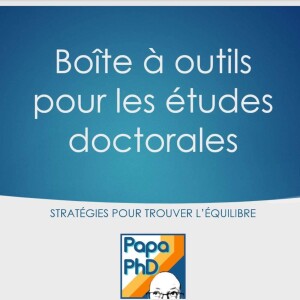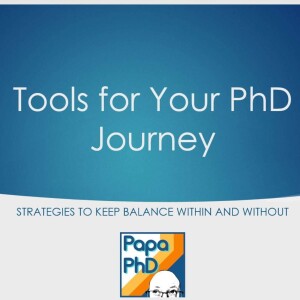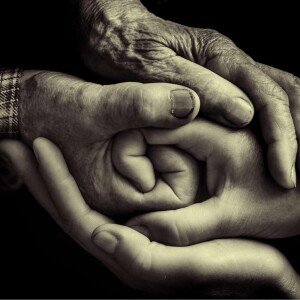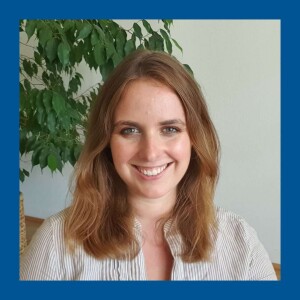Episodes

Monday Mar 09, 2020
Monday Mar 09, 2020
Téléchargez la "Boîte à outils pour votre doctorat" maintenant !
Transcription de l'épisode :
Bonjour! Aujourd'hui, je vous apporte un épisode différent. Aujourd'hui, je vais vous parler de mon parcours - celui qui m'a amené à ce que je fais aujourd'hui et à l'aventure Papa PhD.Votre doctorat est littéralement une aventure - c'est un voyage, une expédition dans l'inconnu. Et certains des plus grands enseignements et souvenirs de vos études graduées que vous porterez avec vous tout au long de votre vie seront les obstacles que vous aurez trouvés et surmontés en cours de route. Et c'est l'un des messages les plus importants que j'aimerais partager avec vous aujourd’hui.Tout au long de cet épisode, je vais vous raconter mon parcours professionnel jusqu'à aujourd'hui et les leçons que j'ai tirées de mon doctorat – Les bons coups et les erreurs.Et si vous restez jusqu'à la fin de l'épisode, j’ai préparé pour vous un guide où je résume les principales leçons que j'ai apprises. Un ensemble de stratégies qui vous aideront à passer à travers l’expérience du doctorat sans trop de difficultés inutiles et à préparer à votre transition vers l'espace professionnel non universitaire ou vers quoi que ce soit qui suivra vos études graduées.Je vais également essayer de partager des conseils sur comment planifier, comment préparer, dès le premier jour, de façon très intentionnelle, sa vie professionnelle, quelle que soit la forme qu’elle prendra.Encore une fois, je partagerai un lien vers ce guide à la fin de l'épisode, donc restez avec moi !Maintenant, pour mon histoire. Vous finirez par voir que j'ai frappé des murs en cours de route, que j'ai rencontré des obstacles, mais j'ai tiré des leçons de toutes ces difficultés. De plus, ayant maintenant interviewé plus de 30 invités sur Papa PhD, j'ai également essayé de rassembler certains de leurs meilleurs conseils et de les distiller dans ce document que je vais partager à la fin de l'épisode.Donc – Mon parcours universitaire a commencé au Portugal. En sortant du lycée, j'avais deux possibilités - deux choses que j'aimais et pour lesquelles j'étais doué : c'était les langues et les sciences naturelles.J'ai suivi la voie scientifique et j'ai fait une licence en microbiologie et en génétique à l'université de Lisbonne. Après ma licence, je suis resté au laboratoire où j'avais réalisé mon projet de fin d'études pendant deux ans au long desquels j’ai participé comme instructeur à différents programmes de formation offerts et où j’ai travaillé avec des bourses de recherche.Après ces deux années, j'ai eu l'occasion de participer à un programme de l’agence gouvernementale INFARMED - l'agence nationale des médicaments au Portugal. À l'époque, les médicaments génériques allaient être introduits au Portugal et j'ai eu le privilège de faire partie d'une petite équipe de diplômés qui ont été formés et envoyés dans des centres médicaux à travers le pays pour expliquer ce qu'étaient ces « génériques » à la communauté médicale, afin de dissiper les inquiétudes ou les doutes qu'ils avaient à propos de la qualité et de la sécurité de ces médicaments.Ça a été une année très formatrice : on nous a appris à parler en public, à présenter les données et à discuter des objections potentielles de notre public cible. Toutes ces compétences m'ont été très utiles par la suite. Et c'était ma première expérience professionnelle en dehors du laboratoire.Après un an comme représentant d'INFARMED, le gouvernement a changé et le programme a été fermé.Après cela, grâce aux contacts que j'avais établis pendant cette année, j'ai eu la chance d'être invité à donner des cours en laboratoire dans une université privée de Lisbonne - une école qui offrait spécifiquement de la formation pour les personnes qui voulaient faire carrière dans les domaines techniques du secteur de la santé. C’était une expérience formidable. J'ai vraiment, vraiment aimé enseigner. Mais ce qui s'est passé, c'est qu’en regardant les professeurs,

Thursday Mar 05, 2020
Thursday Mar 05, 2020
Download "Tools for Your PhD Journey" Now !
Episode transcript:
Hi everyone! Today I'm bringing you a different episode. Today I'll be talking about my path - what brought me here, to what I do today and to the Papa PhD adventure.Your PhD is literally an adventure - it's an exploration, a journey into the unknown. And some of the greatest lessons and memories of grad school that you will bring with you throughout your life are going to be the obstacles you found and surpassed along the way. And this is one of the most important messages that I'd like to share during this episode. What I'm going to talk about throughout is going to be what my career path has been like until today and what lessons I learned going through my PhD - what worked for me and what didn't work for me.And if you stick around until the end of the episode, I have prepared for you a toolkit where I summarize the most important lessons I've learned. A set of strategies that will help you go through your degree smoothly and be prepared for your transition into the non-academic job space or into whatever comes after your degree.I'll also try and share advice on how to be very intentional from day one in planning ahead and preparing your professional life, no matter what it ends up being. Again, I will share a link to this toolkit at the end of the episode, so stay with me.Now to talk about my story. Eventually you'll see that I got stumped along the way, that I hit some roadblocks, but I have lessons learned from all of those obstacles and all of those difficulties. Plus, now having interviewed 30 plus guests on the Papa PhD podcast, I have also tried to collect some of the best advice that they have shared on the show, and to distill it into this document that I'll be sharing at the end of the episode.So – My academic path started in Portugal. Coming out of high school I had two possible avenues – two things I liked and was good at. And these were languages and natural sciences. So, eventually, I followed the scientific path and did a bachelor's in microbiology and genetics at the University of Lisbon. After my bachelor's, I stuck around the lab where I had done my final project for a couple of years, TAing in different training programs and doing research in kind of a post-bac experience. Eventually, I had the opportunity of taking part in a program proomted by INFARMED – the drug and medicine agency in Portugal. At the time, generic drugs were being introduced in Portugal and I had the privilege of being part of a small team of graduates who were trained and sent out to medical centres around the country to explain what generic drugs were to the medical community, to dispel any worries or doubts they had about the quality and safety of these products.It was a very formative year: we were trained on public speaking, on how to present the data, on how to discuss objections. All skills that really served me later on. And it was my first professional experience out of the lab.After one year as an INFARMED representative, the government changed and the program was closed.After that, through connections that I had made in this position, I had the privilege of being invited to give lab classes, but at a private university in Lisbon - a school that was specifically offering training for people who wanted to have technical careers in the health domain. This was a great experience. I really, really enjoyed teaching. But what happened was that, looking at the professors, I started thinking that "I'd really like to teach at that level". And what was the requirement to teach at that level? Well, it was to hold a PhD.So, five years after having finished my undergrad degree, I decided to embark on the PhD adventure. I interviewed in two PhD programs and I was accepted in the BEB program offered by the Center for Neuroscience and cell Biology at the University of Coimbra, a program with a strong neuroscience component.I was part of the 2003 cohort.

Thursday Feb 27, 2020
Thursday Feb 27, 2020
Dans cet épisode, vous allez entendre parler de gratitude, de bénévolat, de service, mais vous allez aussi entendre parler de persévérance, de sens de mission et d’entreprenariat. Ces mots peuvent vous paraître de deux univers différents, mais ils se marient et trouvent un sens dans le récit que nous apporte Francis Etheridge à propos de son cheminement académique et professionnel. Donc restez des nôtres pour une entrevue qui, je crois, vous inspirera dans vos choix de carrière et dans votre vie.
Francis Etheridge a complété un doctorat en gérontologie à l’Université de Sherbrooke. Sa thèse porte sur les difficultés persistantes des centres d’hébergement et de soins de longue durée (CHSLD) à améliorer les soins et services qu’ils offrent à leurs résidents. Ce projet doctoral lui a permis d’obtenir la bourse d'études supérieures du Canada Vanier.
Après avoir occupé quelques postes de gestion dans le réseau de la santé, principalement des rôles-conseils dans des organisations offrant des services géronto-gériatriques, Francis agit désormais comme consultant. Il a fondé une compagnie, Humanique Conseil, par laquelle il offre des services de développement organisationnel et de gestion du changement principalement dans le domaine de la santé, mais aussi dans d’autres types d’organisation. Il conserve également un pied dans le monde universitaire en participant à des projets de cherche en tant que co-chercheur.
Joignez-vous au groupe d'exploration de carrières Papa PhD !
Ce que vous apprendrez dans cet épisode :
L'importance d'avoir un objectif de vie tout le long de votre parcours académique
Ce qu'on peut gagner à avoir une expérience en recherche et de publication au niveau du baccalauréat
L'intérêt d'une approche de recherche active pendant vos études graduées
L'importance de participer de façon bénévole à différents événements, groupes, ou organisations autour de nous
La fierté que nous apporte la défense de thèse et la fermeture de ce chapitre de notre vie
Le rôle important que peut jouer la vie à l'extérieur de notre projet de recherche pour notre équilibre
L'intérêt de méthodes telles que le pomodoro pour augmenter sa productivité
Les perles de sagesse de Francis :
« J'ai toujours été quelqu'un qui disait davantage oui que non, que ce soit pour faire partie d'une association étudiante, pour faire partie des conseils d'administration. Généralement d'être ouvert, donc de participer à des entrevues, des colloques – à plusieurs types d'activités qui sont non rémunérées, qu'on fait de façon bénévole, mais qui permettent, justement, de créer des liens, d'enrichir nos connaissances. »
« Je valorise une conception de la vie, disons, intégrée, et je pense que ce qui m'a aidé, c'est que mon objectif soit réellement un objectif de vie et pas juste on objectif professionnel ou académique. En fait, j'ai été aligné sur cet objectif d'aider les résidents, d'aider le personnel des centres d'hébergement depuis une douzaine d'années parce que ça m'appelle comme personne, comme être humain. Je pense que c'est ce qui m'a drivé à trouver des solutions pour atteindre cet objectif même si certaines portes se sont fermées devant moi è certaines étapes de ce cheminement. »
« Ce que j'encourage, aujourd'hui, c'est de ne pas considérer le travail comme une dimension qui est externe à l'ensemble de nos vies ou qu'on vit en parallèle, mais comme quelque chose d'intégré. »
« Pour moi, ce qui me permettait le mieux d'avancer, c'était des périodes intensives de travail où j'étais, peut-être, moins connecté à d'autres dimensions de ma vie, mais c'est ce qui me permettait d'avancer – des semaines de travail complètes, des fins de semaine de travail complètes pour, justement, éviter ces périodes de reprise, de travail, d'interruption. »
« L'approche de recherche que j'avais adoptée pendant mon doctorat était la recherche-action. La recherche-action est un mode d'intervention tout autant qu'un mode de production de connaissance...

Thursday Feb 20, 2020
Thursday Feb 20, 2020
Coming from a specific domain of research doesn't dictate what your career journey will look like. Your interests, your strong suits, as well as any extra skills you've picked up during your lifetime may reveal themselves to be instrumental and key elements in what you'll do profesionally later on. In this episode of Papa PhD, Clarissa Wright shares how different life and professional experiences built up and brought her from geology and microarchaeology to launching and editing an online magazine.
Clarissa focused on her art from a young age, but her interest in science grew as she studied geology at university of Aberdeen, before completing a Master's in micropaleontology at university of Birmingham. After exploring various ideas, she entered the scientific publishing industry in London at Springer Nature, from which she started freelance writing and founded a science communication digital magazine in her spare time.
Join the Papa PhD Postgraduate Career Exploration Group!
What you’ll learn about in this episode:
The role odd jobs can play in preparing you and in setting you up for the career you want to embark on
Why you should never stop nurturing your interests and hobbies
Why you should get in touch with graduates from your program about their career journey
The gradual process of transitioning into your postac career
How self-study can help you prepare for a job interview in a field that is new to you
How you can build a profitable side-hustle through freelancing
This episode’s pearls of wisdom:
“It wasn't until about 9 months later that I was looking around at what other people in my class were doing and I heard that one girl was an editorial assistant in a physics journal. And I thought: 'That sounds cool – what does that involve?' So I just looked it up and it sounded interesting, so I pushed myself to apply for these.”
“I ended up getting an interview in Cambridge and an interview in London, and got a job in London in a large publishing house as an assisting editor. I was there for two years, during which I learned more about the sicence publishing industry, but it wasn't immediately obvious to me during my studies that that was a potential route to go down.”
“Actually, my job at the time, which was in the health clinic, I managed to use that as extra experience, because I'd studied geology. I think maybe during the application process or the interview I kind of mentioned that I'd familiarized a bit with health science during my time there, so that ended up supporting that unexpectedly.”
“I basically did a bit of research about basics about science public publishing like open access, blind peer review, and things like that. Those questions actually came up in the interview, so that was useful.”
“I started thinking 'how do I work best personally?' and I found that I work quite well just tackling different problems creatively, so I found that, actually, it would be worth it to work my own way, even if I was leaving a very structured and kind of cushiony kind of job. For me, it was just worth it to just have the change.”
Clarissa’s links:
LinkedIn; Naturevolve.com; GNU Image Manipulation Program; InkScape Vector Graphic Editor.
Leave a review on Podchaser !
Support the show on Patreon !
You might also like the following episodes:
Dana Murchison – Science Outreach: PapaPhD.com/1
Kelly Bullock – Science illustration: PapaPhD.com/9
Rob Hutcheson – Health Economics: PapaPhD.com/4
Tamarah Luk – Entertainment Law: PapaPhD.com/10
Launching your podcast?
If you're preparing to launch your podcast, you may be asking yourself what hosting platform to use.
I launched Papa PhD on Bluebrry because I wanted a professional service that would interface with my WordPress website, that would robustly broadcast Papa PhD to all platforms, and that would allow me to grow my podcast in years to come.
And these are the reasons why I'm recommending the Blubrry podcast hosting and syndication platform.
...

Thursday Feb 13, 2020
Thursday Feb 13, 2020
Dans la vie, on peut se faire dire des tas de choses. Entre autres, on peut se faire dire qu'une de nos idées ou qu'un de nos projets est voué à l'échec. Le hic, c'est que cette idée, ce projet, personne ne les voit comme nous on les voit. Dans cet épisode de Papa PhD, Élodie Chabrol partage son parcours académique et professionnel et parle du rôle qu'ont joué la curiosité et la persévérance dans sa transition vers l'univers de la communication scientifique.
Elodie Chabrol a un doctorat en neuroscience et a mené des recherches postdoctorales en neurosciences. Elle a quitté la recherche en 2017 pour travailler sur la communication scientifique en tant que freelance. Elle développe le festival Pint of Science en France et à travers le monde et travaille également sur d'autres projets, dans le but d'aider les scientifiques à partager leurs histoires fascinantes de la meilleure façon possible et de transmettre la passion pour la science.
Joignez-vous au groupe d'exploration de carrières Papa PhD !
Ce que vous apprendrez dans cet épisode :
La beauté et les défis de la vie de chercheurL'importance de développer ses compétences en communication pendant ses études de troisième cycleL'importance de profiter d'un maximum de ressources et de formations offertes par votre universitéCe qu'on gagne à essayer des activités différentes pendant le doctorat ou le postdocLes avantages de faire de la recherche dans un petit laboratoire en début de carrière académiqueComment réagir à des commentaires ou jugements externes par rapport à nos idées et à nos projetsCe que participer à des événements de vulgarisation apporte aux scientifiquesLes perles de sagesse d'Élodie :« Les doctorants, si vous avez des formations pendant la thèse, profitez-en. Les postdocs pareil. En fait, si vous avez des formations qui sont "incluses" dans votre boulot, parce que ça, c'est cadeau, c'est génial. Et puis, pour ceux qui peuvent un petit peu se permettre, essayez pendant que vous avez un job. Oui, ça sera du boulot, ça sera des soirées et peut-être, même, vous allez poser des vacances pour aller à un workshop, mais, du coup, ça vous permettra déjà de vous démarquer. Donc, si jamais, à la fin, vous voulez effectivement faire de la communication scientifique, vous aurez des expériences. Ça vous permettra de tester si vous aimez et, surtout, ça vous permettra d'agrandir votre réseau qui est, au final, probablement ça qui vous donnera votre job, après. »« Pour Pint of Science France, les gens me disaient "Comment tu sais que ça va marcher?" Et je disais "Eh bien, je vais tout faire pour que ça marche". »« Quand on fait un truc sur lequel on est vraiment passionné, on se débrouille et ça marche et oui, peut-être qu'on est un peu crevé, peut-être qu'on ne dort pas très bien et peut-être qu'après on va hiberner un mois après l'événement ou après le festival, par exemple, mais, franchement, si c'était à refaire, je repasserais toutes les nuits que je n'ai pas dormies à ne pas dormir. »« Parfois, il y a des questions toutes simples du public qui, en fait, font les chercheurs voir les choses d'une autre manière et se poser d'autres questions. Et ils nous disent, parfois, "les questions les plus simples, ou les questions de gens qui ne connaissent absolument pas le sujet, ça nous permet de voir les choses différemment." Et, en fait, il y en a qui m'ont dit que ça les avait aidé à réfléchir à des projets différemment. »« Un bon scientifique, même en académie, eh bien, il faut savoir communiquer. »Les liens d'Élodie : Elodiechabrol.com: LinkedIn : Linkedin.com/in/elodiechabrol; Pint of Science : PintofScience.com; Twitter : @EloScicomm. Instagram : @eloscicomm
Laissez une évaluation sur Podchaser !
Soutenez Papa PhD sur Patreon !
Vous aimerez aussi ces épisodes :
Fiona Robinson – Patient education: PapaPhD.com/6James Bowers – Communication consulting: PapaPhD.

Thursday Feb 06, 2020
Thursday Feb 06, 2020
What does glitter have to do with mitochondria? This episode's guest, Paulo Oliveira, might just have the answer for you. And it probably has something to do with science communication and science outreach. In this episode of Papa PhD, I’m bringing you a great conversation where we covered Paulo’s journey into academia, as well as his take on what a 21st century researcher should be and on what skills should be part of their arsenal in the current job market.
Paulo J. Oliveira is currently Principal Investigator at the Center for Neuroscience and Cell Biology, University of Coimbra and an Invited Assistant Professor at the same University. Paulo is also the President of the European Society for Clinical Investigation, the co-founder of the start-up MitoTAG. He has a passion for mitochondrial biology in the context of aging and lifestyle diseases, and for science outreach. Part of his Doctoral and Post-doctoral training was done at the University of Minnesota-Duluth, USA, where he mixed mitochondrial research, playing football/soccer for a team called Port City and shoveling snow in the winter. His two daughters are great gymnasts, a trait that certainly they did not get from their father.
Join the Papa PhD Postgraduate Career Exploration Group!
What you’ll learn about in this episode:
How people who present you with unexpected challenges in your journey can help you grow, if you let them
What you can learn from doing a stint abroad, during your graduate studies
The wonderful world of mitochondria, andtioxidants and redox balance
The decisions and steps around turning your science into a business
How finding a scientific niche that you're passionate about can fuel your research, but also other aspects of your life as a researcher
What you can offer the public through science outreach and what science outreach can bring to you and your research
Strategies to try your hand at industry or entrepreneurship without cutting ties with academia
This episode’s pearls of wisdom:
“Communicating in terms of science is not publishing Science or Nature papers. It's going to the population and saying "This is what we do. We are using some of your money, some of your taxes, to do science that eventually can improve your life". ”
“I think one thing that's failing in most schools, universities, doctoral programs, is this teaching of diverse soft skills.”
“If you're doing research and if you think 'ok... I'm not seeing myself doing this for the next 30 years – what am I going to do?'. You start something. You think about waht society needs, what people need, what institutions need, and you can propose that. Of course, there is this startup boom all over the place, but if yoou fail once, you try again. If you fail twice, you try again. ”
“You should not be afraid or ashamed of looking for advice.”
“We live in a society where people think that failing will mark you for life, and we are all to blame on that. And we also have to blame that on our education system that teaches kids that they should not fail.”
“There are risks in everything. People have to find a place where they are more motivated, where they find the perfect ecosystem for them to work, and where they find the motivation to thrive into something. And sometimes, in academia you cannot find that.”
“What counts is that you have the expretise to do high quality work wherever you are [...]. It doesn't matter if we are top experts on protein X that does whatever.”
Paulo's links: MitoXT Group: Facebook.com/MitoXT; MitoTAG: Facebook.com/pg/mitodiets; European Researcher's Night
Leave a review on Podchaser !
Support the show on Patreon !
You might also like the following episodes:
Chris Kent – Biotech Startup CEO: PapaPhD.com/11
Sathy Rajasekharan– Science communication: PapaPhD.com/16
Fábio Rosa (PhD student), Gil Costa (scientific illustrator), Patrícia Monteiro (principal investigator): PapaPhD.com/24

Thursday Jan 30, 2020
Thursday Jan 30, 2020
The thought of transitioning into your professional life can be daunting at times. What is expecting me on the other side? Am I going to be happy? Will it be easy? How much am I going to make? If you add into the mix the question of “do I stay in academia? Am I a failure if I don’t?”, it can become an overwhelming and paralyzing place to be, emotionally. In today’s episode, Liliana Vitorino shares with us how she crossed this ford and what factors were important for her at the moment of taking hard decisions along her journey. She also talks about her experience getting into industry and growing professionally in this space.
Liliana has a PhD in microbiology from the Faculty of Sciences of the University of Lisbon, in Portugal, and is currently an international product manager for a medical devices company. Travelling a lot, working nonstop but having fun along the way and always with time for friends and family. Liliana believes that the difficult things are what challenge us to grow!
Join the Papa PhD Postgraduate Career Exploration Group!
What you’ll learn about in this episode:
What you’ll learn about in this episode:How life events and paradigm changes can impact key choices in your life, and how accepting them can help you navigate these transitions Why you should allow yourself to try new professional avenues at transition points in your academic pathHow opportunities that feel underwhelming can be steppingstones to better ones and eventually lead you to your ideal jobThe concept of a career development plan as used in industryParticularities of the industry team cultureWhy as a PhD you'll be a great asset in a team in industryHow to manage your expectations in terms of pay when you're transitioningEntry-level salaries in Europe for your first post-PhD industry jobThis episode’s pearls of wisdom:“You need to train yourself and be curious if you're moving into this field. Read books about marketing... Even now that I'm moving more towards a managing position, listening to podcasts about management, marketing. You need to be always up to date on all the topics.”“One good thing about being in industry is that there is a clear career path that they set for you and they discuss with you, and they put in your development plan: what are the gaps that I have for this job and for the future and how can I overcome those, right? And how can the company help you develop overcome those gaps.”“What we need to have is an opportunity to sit with an interviewer and show him or her all the skills that we have or that we acquired during our PhD, because it's so common for people to think that if you are doing a PhD or if you are doing research, that you are a crazy scientist who lives in a bubble.”“During the PhD, we deal with so many different stakeholders, we also need to influence our colleagues, our bench buddies, to help us, to discuss. Even if it's only our project and our colleagues in front of us are working on other projects, we don't work in silos.”
Leave a review on Podchaser !
Support the show on Patreon !
You might also like the following episodes:
David (Viva Frei) Freiheit – Youtube content creator: PapaPhD.com/15Tamarah Luk – Entertainment Law: PapaPhD.com/10Simon Moore – Industry research: PapaPhD.com/18
Launching your podcast?
If you're preparing to launch your podcast, you may be asking yourself what hosting platform to use.
I launched Papa PhD on Bluebrry because I wanted a professional service that would interface with my WordPress website, that would robustly broadcast Papa PhD to all platforms, and that would allow me to grow my podcast in years to come.
And these are the reasons why I'm recommending the Blubrry podcast hosting and syndication platform.
Click on the button below or use the promo code PapaPhDBlue on the Blubrry website to unlock a one month free trial:

Thursday Jan 23, 2020
Thursday Jan 23, 2020
We always want to project into the future as the best possible version of ourselves. But we often fall into the trap of setting our goals based on what we've been told we should aim for, or what we see our neighbors aiming for. A big part of enjoying our time in graduate school depends on being in tune with our personal values, our strengths, and with what makes us tick. This week, Falisha Karpati shares how she came into science and how the transitioned from a PhD in neuroscience to an altac position doing what she loves most.
Falisha Karpati is a skills development professional with a background in neuroscience currently based in Montreal. She completed her undergraduate studies in neuroscience at the University of Toronto, then a PhD in the Integrated Program in neuroscience at McGill University. Combining her passions for science and the arts, her PhD research investigated brain structure in musicians and dancers. She explored the field of skills development during her grad studies through part-time work designing and facilitating training activities at McGill, and jumped into this full time right after completing her PhD. She now works as a Program Officer at the Healthy Brains, Healthy Lives initiative at McGill University, where she manages a training program for students and postdocs with an interest in neuroscience.
Join the Papa PhD Postgraduate Career Exploration Group!
What you’ll learn about in this episode:
What you can gain by becoming a work/study student in terms of experience and networking
How you can expand your skillset and your network by working or volunteering in university programs or in student government
How important it is to determine what your strengths are as a graduate researcher to start planning on what you'll do after your degree
What types of skills and training may be important in preparing you for your #withaPhD life
This episode’s pearls of wisdom:
“Working or volunteering with organizations on campus, they're very understanding of the needs of grad students, so if I say I can't come to a meeting because I need to do my lab work or I need to give a presentation, they were fine with that.”
“If you want to know what it's like to work in a particular field, send them an email and ask for an hour coffee meeting – people are pretty happy to do that. But if you are going to do that, make shure that you go in prepared, because if you go in and somebody is giving up an hour of their time for you and you're like 'so... tell me something' it's not going to work. But if you have a few questions and have just a casual discussion with them, that's a great way to learn.”
“I think that's also coming from a time where there were a lot less people doing PhDs, it was less accessible, there may have been less people interested in it, so the percentage of people going from PhD to academic research was extremely high. But at this point that's not the case at all – there's a lot of people pursuing PhDs because they're passionate about the research and they want to know more about that particular topic, they want to contribute to the knowledge or treatments, or policy in that particular field.”
“I feel like really, the only failure is doing something because you feel that you have to or because you feel pressured, not because you actually want to. And if you pursue whichever career path you feel most comfortable in and that fits best with your interests and what you want to accomplish, then it is absulotely never a failure.”
Falisha’s links: McGill.ca/HBHL; Twitter: @HBHLMcGill
Leave a review on Podchaser !
Support the show on Patreon !
You might also like the following episodes:
Adriana Bankston – Science Policy: PapaPhD.com/12
Cindy Hovington – Education Specialist: PapaPhD.com/22
Emily Roberts – Graduate Financial Coach: PapaPhD.com/8
Inês Campos Costa – Career advisory: PapaPhD.com/41
Launching your podcast?
If you're preparing to launch your podcast,

Thursday Jan 16, 2020
Thursday Jan 16, 2020
Deciding to embark on graduate studies can be a big step to take. For a lot of you out there, it represents your first leap into independent life and can carry a lot of unknowns, especially if you are a first generation graduate student. One of the big challenges this decision carries, besides having to deal with stereotypes to do with “staying in school” versus “getting a job” is that for the first time you will be fending for yourself as an active adult and negotiating your way through applications and offers for what will be, for all intents and purposes , a 5-year professional engagement leading to your degree. This week, Stefanie, the host of the Career Conversations channel on Youtube will be sharing her experience in her ongoing doctoral research and some insights she has drawn from her work on Career Conversations.
Stefanie is a PhD student in skin cancer research and as a side project, she has a Youtube channel where she helps fellow PhD students make the most of their careers by showing them the features of their careers that they are in control of.
Join the Papa PhD Postgraduate Career Exploration Group!
What you’ll learn about in this episode:
The difference in effort and amount of information from high school to university
The importance of weighing how the detailed curriculum fits with your interests when choosing a master’s program
Why you should allow yourself to come back on decisions you may have made earlier in your life – new experiences and new connections may change your outlook completely later on
How an internship in industry can rekindle your passion for research and even lead to publications
How learning to trash a project that is not working is a good skill, which is predominant in industry
Some specifics of industry culture Stefanie was not expecting at the outset
How networking can help you in your academic and non-academic applications
How a supervisor/superior who inspires loyalty drives productivity and morale up in a team
What you can learn and gain by taking active part in university/institute governing bodies
How important it is to set standards for yourself when looking for a position, minimum conditions to be met for you to consider an offer
How being detached from your results and your successes will help you keep moving forward at a healthy pace
This episode’s pearls of wisdom:
“I think that part of why I thought I hated science was really the university and the studying, and so on, which didn’t go well with me, but as soon as I had some independence, I really fell in love with science again.”
“What inspires me the most about my current supervisor is actually her leadership style, because she is a very, very kind person, but she is definitely not a pushover.”
“One thing she said to me was ‘Always show up as the best version of yourself that is available to you on each particular day.”
“As researchers, we are very often measured in citations. This is not a good way to be measured – I don’t think it says anything of the quality of a researcher, but this is still the reality of how researchers are hired, very often. It is not the only factor, but it is a huge factor. And we are not in control of whether people like our paper, but we are in control of how many people see our paper. And since I’ve realised that we can tweak the algorithm, especially of Twitter, very much, and that there are a lot of scientists on Twitter, I thought ‘Why not show people how to do this?’.”
“Just ask for whatever you want and you will be surprised by how willing people are to help you.”
“Most people don’t realize how valuable their talent really is. And I hope that there will come a day when universities will be competing for talent by offering proper work conditions.”
“In every sort of negotiation, you have to be willing to leave the table.”
This episode's links: Career Conversations YouTube channel; Twitter – @CareerConversa1; Instagram – Career_Conversations.

Thursday Jan 09, 2020
Thursday Jan 09, 2020
They say "if life gives you lemons, make lemonade." But what if life gives you the proverbial lemons, you press them, and apple juice comes out? In this episode, Pedro Resende shares with us how he came to be a researcher after a stint in industry, and how after accepting some hard noes from the universe and reorienting, he ended up being exactly where he wanted to be at the outset.
Pedro has worked in Portugal, UK and USA as a life sciences researcher, both in academic and industry roles. In parallel with his research, Pedro co-founded two professional associations and experienced roles in policy advice. Pedro is also co-founder and the director of Chaperone, an online marketplace for career development for scientists.
Join the Papa PhD Postgraduate Career Exploration Group!
What you’ll learn about in this episode:
How valuable an internship in industry can be before graduate school and how it can help you stand out when applying to PhD programs
Why you should choose a city you'll enjoy living in, of you're going abroad for your graduate studies
The importance of connecting with the expat student community when studying abroad
What you can gain by taking active part in the university/institute governing bodies as a student representative
Why you should try to take part in interdisciplinary projects and activities around you
This episode’s pearls of wisdom:
“I cannot stress enough how to found and manage professional associations can be a fantastic learning experience for roles outside acedemia, let's say – as an entrepreneur or as a community manager, or as a project manager, or anything that involves management of projects and people.”
“It's surprising how many political decisions are made without evidence. Evedence-based decisions in politics are not common and for someone who works in science, this seems shocking. But it's true. It is our role as researchers to defend that we must get the right data to the politicians and to make them be aware of this data and to use them to guide their decisions.”
“[In the US] it's recommended for people as researchers to be involved in other projects. It benefits the society, it benefits the research also, ultimately. This is true for researchers, but it's true for other fields of study. Nobody gains from everybody being closed in their environments, closed in their offices.”
Pedro’s links: Maria de Sousa Summer Research Program; All Time GABBA (ATG); European Health Parliament; Chaperone.online; Twitter: @PepeResende, @ChaperoneOnline
Leave a review on Podchaser !
Support the show on Patreon !
You might also like the following episodes:
Inês Thomas Almeida – Musicology: PapaPhD.com/27
Kirsten Sanford – Science communication: PapaPhD.com/13
Simon Moore – Industry research: PapaPhD.com/18
Tamarah Luk – Entertainment Law: PapaPhD.com/10
Launching your podcast?
If you're preparing to launch your podcast, you may be asking yourself what hosting platform to use.
I launched Papa PhD on Bluebrry because I wanted a professional service that would interface with my WordPress website, that would robustly broadcast Papa PhD to all platforms, and that would allow me to grow my podcast in years to come.
And these are the reasons why I'm recommending the Blubrry podcast hosting and syndication platform.
Click on the button below or use the promo code PapaPhDBlue on the Blubrry website to unlock a one month free trial:
Try one free month with Blubrry !
If you are starting a serious podcast project, do consider one of the first podcasting hosts out there, offering state of the art services, including IAB certified statistics, based on years of experience in the podcasting space.
Happy podcasting!
